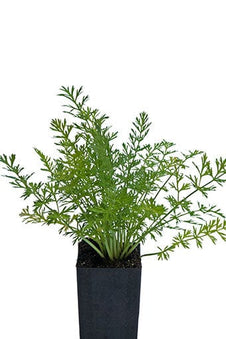
Caraway
Caraway
- Low stock - 10 items left
- Inventory on the way

Usually available: April to November
Life cycle: Biennial
Height: 60 - 90cm
Position: Sun / part shade
Soil preference: Well drained
This is how we pack and send your Herb Plants to all states except TAS & WA
You will receive
- 1 Caraway Herb Plant in a 50 X 75mm tube - General growing instructions
All of our Herb Plants are grown organically with certified organic potting mixes and fertilizers
Botanical Name: Carum carvi
Caraway is a member of the carrot family and looks much like a carrot plant prior to flowering. It is an upright growing plant, with a spindle shaped tap root. During flowering it sends up tall stalks that may reach from 60-90cm high. Sometimes this does not happen until the second year, so plants may not be very high in the first season. The stem is hollow and branching, while the foliage is feathery and held on the stem in threes or opposite pairs. When flower stalks appear the tiny, white and pink flowers are held in umbels at the top. Umbelliferous refers to the flat topped cluster of flowers held at the top of several stems, all arising from the same main stalk. The summer flowers are followed by the aromatic fruits, which are often mistakenly called seeds. The aromatic, crescent shaped fruits are brown and have 5 distinctive ridges.
Caraway is grown commercially in many countries and is native to Western Asia, Europe and North Africa. Alternative names include Meridian Fennel and Persian Cumin. Caraway may sometimes be confused with Caraway Thyme, so check that your selected plant has the scientific name Carum carvi. The origins of the scientific name are not clear. There seems to be a link between the Latin ‘cuminum’ and the Greek ‘karon’ both of which mean ‘cumin’. However, ‘cumin’ has since been adapted to ‘carum’, which is now the Genus name referring to Caraway. There are also links to the Arabic word ‘karawya’ which means seed.
Growing Conditions
The Caraway plant will perform best in full sun or part shade. Ideally a warm sunny spot should result in good results, especially in a light clay or loamy soil. This herb prefers a pH of 4-8 -7.6 and moist, fertile soil. Damp or wet soil should be avoided, especially in winter. The first year plants may not set seed, as often this biennial herb does not develop the large flower stalks until the second or third year. Caraway may act as an annual in cold areas and biennial in warmer climates.
The seeds, or more correctly fruits, will ripen after flowering finishes in summer. They can then be dried and shaken into containers for later use. In a cold winter season the plant may die down and return the following spring. If they do not, then new seed is easily sown, although they can be slow to germinate. Dividing or transplanting existing plants is not possible since Caraway and similar plants, do not respond well to root disturbance.
Caraway is a useful companion plant because the strong scent helps to confuse insects and also masks the presence of other vegetables or herbs that might otherwise be attractive to insects that might use them as a food source. Beneficial insects such as predatory wasps and flies that prey on aphids may also be attracted.
Medicinal Uses
The seeds of the Caraway plant are high in both protein and fat, so they have nutritional value as well as a history of medicinal use. The seeds are often crushed or chewed to help release the active ingredients, including limonene and carvone which is up to 40-60% of the essential oil content. Caraway is anti- spasmodic and carminative so it is used mostly for digestive problems, including cramps, stomach ache or pain due to excessive stomach gases. A tea made from the seeds may be taken up to 4 times a day to help relieve mild stomach ache. A mild infusion is also considered safe for children with stomach pains and digestive complaints. Caraway is also diuretic, tonic and expectorant.
Seeds may be chewed after meals to sweeten breath, or used as a throat gargle for the same purpose. Powdered seeds may be made into a poultice for bruises, or used to treat ear aches. There is some research to indicate that Caraway is also good for endocrine, or hormonal, support for individuals with autoimmune disorders, in particular Hashimoto’s hypothyroid. This herb is also considered to be useful for increasing milk flow for breast feeding women. Overall, traditional use is similar to that of anise and fennel.
Culinary Uses
The leaves of the Caraway plant have a mild parsley or dill taste and the young leaves will give a pleasant flavour to soups, stews, and salads. Older leaves are taste a little stronger, but they may be cooked like spinach. The roots may be cooked like a vegetable and have a parsnip like taste. The seeds or more accurately, the fruits, have a pungent anise like aroma and are used to flavour rye bread, cakes, goulash, cabbage, sausages, some cheeses, cooked apples, and even beverages like Schnapps. Caraway Thyme is a different herb, but the two may be used interchangeably in many cases.
Other Uses
Caraway seed/fruit is used as part of the fragrance for soaps, lotions and perfumes.
All information provided on this website is for informational purposes only. Please seek professional advice before commencing any treatment.




